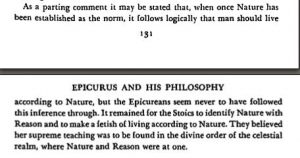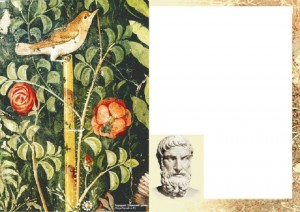In the past, we have approached the problematic issues related to who defines virtue and how, and what place if any virtue should have in Epicurean ethics, by evaluating Frances Wright’s passages from A Few Days in Athens concerning the subject. This will likely be the first in a series of follow-up dialogues on virtue as means and on pleasure as the end, as well as on other doctrinal differences–like the crucial one on nature as the guide rather than arbitrary and abstract ideals–, to help students of philosophy–particularly those who argue that there is little to no difference between the two schools–to clearly understand the differences between the Epicurean and the Stoic schools.
The discussions began on our facebook group when one of the members shared a couple of quotes on the subject. For the benefit of those studying the differences between the two schools, the dialogue has been edited with links and commentary, and the underlined comments denote opinions or views that are clearly Stoic and/or otherwise non-Epicurean, in order to bring out what we consider to be some of the key differences of opinion and to encourage discussion about if and why, and to what extent, these issues matter.
 “Those who place the Chief Good in virtue alone are beguiled by the glamour of a name, and do not understand the true demands of nature. If they will consent to listen to Epicurus, they will be delivered from the grossest error. Your school dilates on the transcendent beauty of the virtues; but were they not productive of pleasure, who would deem them either praiseworthy or desirable?” – Toquatus
“Those who place the Chief Good in virtue alone are beguiled by the glamour of a name, and do not understand the true demands of nature. If they will consent to listen to Epicurus, they will be delivered from the grossest error. Your school dilates on the transcendent beauty of the virtues; but were they not productive of pleasure, who would deem them either praiseworthy or desirable?” – Toquatus
“Ask, and she will tell you, that happiness is not found in tumult, but tranquillity; and that, not the tranquillity of indolence and inaction, but of a healthy contentment of soul and body. Ask, and she will tell you, that a happy life is like neither to a roaring torrent, nor a stagnant pool, but to a placid and crystal stream, that flows gently and silently along.” – A Few Days in Athens, Chapter X
Banton. Good and bad means good and bad for our happiness. Nothing is bad for happiness. Unhappiness doesn’t exist. Neither does the devil even though people will claim the experience of it.
Eric. Banton, I believe though we must weigh pleasure in terms of its greatest good to ourselves and others. So that may not be the most readily available peace, tranquility, and happiness. Sometimes we must delay it or hold off on it so that it can in fact produce a greater pleasure for all. Hedonic calculus matters here.
The devil has no empirical evidence to Epicurus’ naturalistic view. You’re right, there is no evidence for a devil, and thus it is nothing to us.
Banton. We must weigh pleasure in terms of the greatest good (what makes something good? We want it. That’s it.) Unhappiness likewise is nothing. We simply do what we want. We are free. I have a different take here. I don’t believe I’m 100% Epicurean but I think he is as close as we’ve gotten.
For an Epicurean reply to this, read these reasonings on Polystratus’ Herculaneum scroll, where he argues that good and bad can be discerned in nature as secondary or relational properties of things based on whether they produce pleasure or aversion.
Hiram. By “greatest” here you mean long-term, no? Not necessarily “collective“?
Banton. I was quoting Eric. I don’t believe there is a greatest good. The greatest good is whatever I want most.
Hiram. Without evaluating what your desires are and their repercussions, whether they are necessary or not, etc?
Banton. We are free to evaluate or not. So if I want to get drunk and I don’t believe anything makes that wrong or bad, I’m free to get drunk. Or anything else. That’s just an example.
Hiram. If you are exempt from hangovers and from damaging your personal relationships by being obnoxious when drunk.
Eric. That’s a fair example, but weighing the cost between pleasure and pain, getting drunk versus getting buzzed is a real differential IMO. One is Epicurean, the other Cyrenaic (This could be disputed). If you recall, Epicureanism is ‘virtuous pleasure’ so that act of drinking should be weighed with moderation and temperance.
Hiram. Rather than moderation and temperance, the specific word used in the sources is rather “advantage”, or sometimes “mutual advantage”.
Banton. Point is we are free.
Hiram. You are. But freedom can hinder or make happiness. This is why we need ethics.
Banton. Ah that’s where we disagree.
Hiram. Nature won’t give you a choice: if you plunge into a fire pit, you will burn and it WILL hurt. This is what is meant by the guidance of nature via the canon / via our own faculties.
Banton. Yet people have chosen to do it.
Hiram. Which is why we are so critical of other philosophies that “poison human happiness” (citing Frances Wright).
Banton. But you don’t know they weren’t happy to do it. Mohammed Bouazizi.
Hiram. I need context to judge in each case, so we can untangle this crucial matter. If a man is happy murder 50 people because of his faith, then that man was immoral and did not study philosophy, but yielded to superstition and arrogance. This is why Polystratus argued that seeking “virtue” without the study of nature only leads to arrogance and superstition and that when people do that, virtue comes to nothing.
Banton. Virtue, or the good, is only what a person wants. It’s not objective. I guess that’s the point. Consensus agreement only proves a consensus agreement. Epicurus believed in unhappiness and so tried to find ways to minimize it. I’m saying unhappiness does not exist, only the belief in it and the experience of that belief.
Cassius. This is bizarre. Epicurus talked about pain, and pain certainly exists to us. What exactly are you saying?
Hiram. This is where you’re disagreeing with Epicurus, just to clarify so that everyone understands this point. Epicureans believe that nature sets a standard, and that humans are free to use their pleasure faculty within the guidelines set by nature. Epicureans also advise people to study our own nature so that we can understand those guidelines, which desires are natural and which not, etc. Nature is the guide, and culture frequently corrupts ethics.
Banton. Pain does not cause unhappiness. Judging the pain as bad does. But what does bad mean? It means it causes unhappiness. So the belief in unhappiness is the cause of unhappiness. If I don’t believe pain can make me unhappy, I may seek to minimize the pain but I’m not going to feel unhappy about it. Epicurus believed unhappiness happens as a result of certain stimuli. The Stoics believe unhappiness happens as a result of other stimuli, namely desiring things not under your complete control. Both schools prescribed a way to control stimuli. I’m saying unhappiness is a myth, like the devil, and one only experiences unhappiness as a result of their belief in it. When you no longer believe in the devil (unhappiness) you don’t have to replace that with other beliefs. You are simply free to follow your desires and do what you want, whatever you want.
Hiram. You are platonizing unhappiness and deviating from what your nature requires when you reason this way.
Banton. What my nature requires for what? I’d love to hear the answer to that question.
Hiram. All that your nature requires is some food, human association, a home, health, safety. These are the kyriotatai or chief goods. They are the desires that are both natural and necessary. If you are grateful, you can live like a king with a basic provision of these things.
In the PDs you will see that there are desires without which you suffer. They are natural. We know that if you do not eat, you die. If you lack safety of a home you, may suffer from exposure or external threats. There’s research that shows isolation is a health risk factor on par with obesity and smoking, so you need other people. Your own nature and health will require these things. Your own body will require them.
You *could* ask why or what for, and you could posit answers (for those questions) like natural selection or whatever, but there is no point arguing with your own nature. This is what we mean by taking nature as your guide: she does not care. If you don’t eat you WILL suffer hunger. If you eat, you WILL experience pleasure.
Banton. So our nature requires things for survival and pleasure. This is not a revelation. Now if you believe we need survival and pleasure to be happy, to know subjectively that we don’t have to feel bad, lament, be dissatisfied then I disagree. And that’s my point, nothing is required for happiness, inner peace, inner joy.
Hiram. If we don’t survive, we’ll be dead: happiness won’t even be an issue. But if you’re saying that we don’t need pleasure to be happy, then what do you even mean by happiness? Are you platonizing it also? Are you dreaming that you’re happy while in physical pain and mental anguish?
Banton. Yes, if we’re dead nothing will be an issue, but to my knowledge this philosophy is not about survival and I don’t think we need a philosophy of survival. Most folks already know we need food, etc.
And yes, I’m saying we don’t need physical pleasure to be happy. People will tolerate the worst pain and circumstances and not be unhappy. As for mental anguish, that’s unhappiness and it is not caused by pain but by belief. Pain and pleasure are irrelevant to happiness.
Also, the belief that we need pleasures to be happy is really unhappiness. People fear not having what they need. Fear is unhappiness, or more accurately the anticipation of unhappiness. If they ever find themselves in such a position as they anticipated they will also be unhappy. Not because they don’t have what they need to be happy but because they believe they don’t.
Hiram. Alright, so what you are describing is Stoic doctrine and it seems that you are an entirely convinced Stoic. It does not seem like you are in the Epicurean process of therapy or interested in evaluating it.
Banton. I’m most definitely not Stoic. The Stoics also believe something is necessary for happiness, namely virtue or being good. So they try to be good to be happy, you guys try to minimize pain and maximize pleasure to be happy.
Hiram. You’re also most definitely not Epicurean, and your last three comments are Stoicism. Maybe you’re a certain KIND of Stoic, an unorthodox one, but you’re not a student of Epicurus. You have not established pleasure as the end. If your read Polystratus, or the Principal Doctrines, or Norman Dewitt, you will understand that this is essential in order to profit from this discourse: that we are committed to the rational and calculated pursuit of pleasure and the avoidance of pain.
Banton. I like to believe I’m an independent thinker. I think pleasure is closer to what I see as the truth than virtue. But physical pleasure, while preferred in some circumstances, does fulfill what I see as the end which is happiness.
Hiram. That’s right. You’re an independent thinker. But this discussion has been good to help people grasp some of the distinctions between the two schools, how we view nature as our guide, how virtue or “good” or some other arbitrary ideal is not set by nature, etc.
(on a separate thread within the same discussion)
Banton. People automatically weigh the costs and based on their values, they do what they want. The problem with these philosophies is that they all propose an ideal way of being. There is no ideal way of being. People are free to decide what is ideal to them.
Hiram. So just to clarify where Epicurus comes in with moral guidance, here he says that nature has established certain (empirically knowable) limits and guidelines, and made them easily evident to our faculties including the faculty of pleasure and aversion. The study of these natural limits is what makes us philosophers.
Eric. Sure, we’re all going to pursue the things that give us pleasure and happiness, but Epicureanism wasn’t intended to be a free license to pursue any old pleasure. Pleasure according to the philosophy meant being without physical and emotional pain, so some acts and practices need to be weighed in that light, otherwise it’s just hedonism/sensualism
Hiram. There’s absolutely nothing wrong with rational hedonism, it’s uncalculated hedonism that we criticize.
Eric. Is that supporting what I’m saying or intended to say something different?
Hiram. Supporting, but also ensuring that we do not look at hedonism with the kind of judgmental eye that Nietzsche associates with being “weary of this world”. One of the Principal Doctrines says that our faculties never shun pleasure. Pleasure can only be bad when the consequences are so poisonous to future pleasure that they neutralize the benefit. PD 20 is what I’m thinking of.
Eric. Ugh, that translation is cryptic!
Concerning the various translations of the Principal Doctrines other than the one found on epicurus.net, there is one by Peter Saint Andre available from Monadnock, another one by Robert Hicks on an MIT page.
Jason. Definitely not my favorite translation of PD 20. Strodach’s is preferable:
The body takes the limits of pleasure to be infinite, and infinite time would provide such pleasure. But the mind has provided us with the complete life by a rational examination of the body’s goals and limitations, and by dispelling our fears about a life after death, and so we no longer need unlimited time. On the other hand, [the mind] does not avoid pleasure, nor, when conditions occasion our departure from life, does it come to the end in a manner that would suggest that it had fallen short in any way of the best possible existence.
Eric. Applause!!!
Jason. Cassius’ rephrasing is great too:
Bodily pleasures seem unlimited, and so the body seems to wish to live forever. But the mind, recognizing that Nature does not allow the body to live forever, and recognizing that there is nothing to fear in the eternal time after death, guides us to a complete and optimal life, and we then realize that we no longer have the need for an unlimited time. Even though the mind enjoys pleasure, the mind does not feel remorse when the end of life approaches, so long as the mind has led the person to live the best life possible to him according to Nature.
Ronald. Epicurus says be virtuous in order to be happy, the stoics say be virtuous and you will be as happy as possible. I’m not sure there is a lot to fight about here.
(We would not have a controversy thousands of years after the foundation of the two schools if that were really the case)
Hiram. lol …. it’s a 2,300 year old fight. Ronald, so when a Muslim believes that the Quran 4:34 orders him to beat his wife and that it would be virtuous to do so, and he physically attacks her, where in this equation do you find pleasure? If virtue is not defined according to nature, and is just a Platonic imaginary ideal, what becomes of virtue? This is what Polystratus meant in his On Irrational Contempt when he said “virtue without the study of nature comes to nothing but arrogance and superstition”.
Panagiotis. Nature is the basis of everything.
Eric. I am absolutely convinced that the Roman Stoics believed what Epicurus taught, namely ‘virtuous pleasure’ produces happiness, peace, and tranquility. They (meaning Neo-Stoics) end up nit picking this, vacillating between what I just said, and practicing ‘virtue for its own sake’ or duty for duty’s sake. I can give you at least 10 quotes that show that the Roman Stoics didn’t say anything like Virtue for its own sake but rather being virtuous produces tranquility. So I guess it all depends who you’re asking. I believe you are correct there is not much to fight about since Epicurus simply interweaves virtue and tranquility.
Cassius. I think the only point I’ll offer, at least for the moment, is to go back to the quote: “were they not productive of pleasure, who would deem them either praiseworthy or desirable?” The word “happiness” is ambiguous to cover over a multitude of disputes. It is Epicurus who focuses on “pleasure”, and if one keeps to “pleasure”, then a lot of these ambiguities sort themselves out, and it’s much easier to see who is agreeing with Epicurus and who is disagreeing with him.
Ronald. The quote I think supports my point. When Epicurus says “were they not productive of pleasure,…” he seems to be conceding that they are productive of pleasure.
Daniel. (I) agree, and the real proof Epicurus truly understands what he talks about is how easy it is to understand pleasure and prudence without the ambiguities of other philosophies based on a telos focused purely on reason, virtue, or heavenly bodies.
Cassius. Of course “they” are productive of pleasure, but the question is what “they” are. Are “they” something arbitrarily defined by religion or by logic as virtue, or are “they” those activities defined by what is in fact productive of pleasurable living? The Stoics and others choose the former definition, the Epicureans the latter, and never the twain shall meet in theory, just in practicality. The error is in choosing theory that does not lead to pleasurable living vs. theory that is defined as leading to pleasurable living.
Ronald. “Just in practicality”. Exactly. I am not saying there is no difference, just not one where argument is of practical value. And I think Epicureanism is all about practical value.
Eric. Agreed, for the most part. If you’re willing and it’s appropriate, I think it would be beneficial to share all the quotes by the Roman Stoics that agree with Epicurus. I’ve spent a good amount of time collecting those passages that make ‘virtue for its own sake’ absurd and do in fact show that often they see virtue as a means to producing pleasure. Stoics do seem confused at times and you’re right that Epicurus is the one who focuses solely on virtue FOR THE SAKE OF pleasure.
Jason. I would enjoy that if you were to put a page or post together, Eric. It might serve my purposes to illuminate where Roman Stoics were “right” instead of pointing out how they were wrong to my friends, who wave the Stoic flag yet refuse to acknowledge their deviation from ancient Stoic thought.
Since they’re into deviations, a little positive reinforcement towards showing how their behavior and natural tendencies favor true philosophy–instead of their confused conceptions–might help them jump ship, if I could quote Stoic sources instead of simply arguing.
Eric. Interestingly, I’ve hit a brick wall (with Stoics) with trying to demonstrate how the Roman stoics did promote virtue because it provided peace of mind, freedom, etc. I do recognize the differences in terms of chief ends. I believe both parties are promoting ‘virtuous pleasure’ ultimately, however confused it might sound. Let me say this, Much of what Epictetus, Seneca and MA promoted was a life where one manages desires, aversions, impressions judgments FOR tranquility!
Jason. I’m not surprised. It appears that modern “Stoics” are quite confused about the purpose of philosophy. If you don’t acknowledge that philosophy has an end-goal, how can one derive a purpose for studying it?
Eric. They want to say that virtue is its own end, its own reward. They want to say it like a purse lipped moralist. They have to ADD tranquility. Check out this Seneca quote:
Pleasure is not a reward for virtue, nor its cause, but is something added on to it. Virtue is not chosen because it causes pleasure; but if it is chosen, it does cause pleasure.
The joy which arises from virtue . . . like happiness and tranquility . . . are consequences of the greatest good, but they do not constitute it.
– Seneca (Pierre Hadot translation in Inner Citadel)
What a bunch of hog shit! Elsewhere Seneca writes an entire letter On Tranquility of Mind where in he eases his friend with all kinds of methods to bring him to tranquility. Epictetus states a number of times what the practice of virtue is FOR, namely tranquility
Oh Seneca! Reading his works I get the distinct impression of a schoolboy on the verge of getting caught with his hand in the cookie-jar, freezing in place, not knowing whether to remove his hand grasping cookies or leaving them behind. He does seem to me a ‘rider of walls’ It’s just that all this bickering is not ultimately (about) differences of kinds. They are degrees in my view. I’m a student of ‘philosophies of virtuous pleasure’, and there are fascinating and useful agreements not just in Hellenistic philosophies but early Asian ones as well. Here’s Seneca talking like an Epicurean:
Seneca says about tranquility:
We are, therefore, seeking how the mind can follow a smooth and steady course, well disposed to itself, happily regarding its own condition and with no interruption to this pleasure, but remaining in a state of peace with no ups and downs: that will be tranquility.
And he doesn’t say this lightly:
But what you are longing for is great and supreme and nearly divine – not to be shaken.
Tranquility is GREAT, SUPREME and NEARLY DIVINE.
Hiram. It is unclear if the original Seneca passage that was translated into tranquility was “ataraxia”, which is an Epicurean term also. In either case, for the sake of clarity: we in Epicurean philosophy consider pleasure as the end, which can be qualified as tranquil pleasure, virtuous pleasure, and by other words. The danger with using fuzzy terms like virtue is that they can have wildly diverging meanings in various cultures, whereas pleasure is much clearer, and it’s a natural faculty used broadly enough to be a useful end. And we believe that it is nature itself that has set this standard for mortals.
Cassius. For anyone lurking who wants to compare the stoic quotes, here is my chart. And Eric, this is the irreconcilable point. The Stoics promote something they call virtue devoid of pleasure. The Epicureans promote virtue DEFINED by pleasurable result. And that is why it is very perilous to speak loosely of tranquility. Calmness in the experience of unbroken pleasure is desirable. Calmness in and of itself is not desirable nor the goal of Epicurean living. Yes that is a pretty good statement of their confusion.
Eric. As an aside: it does not appear at all there is a difference between ataraxia and apatheia EXPERIENTIALLY. The times in which the Roman Stoics say virtue produces peace of mind or tranquility, they seem to do so when they are taking about managing desires and practicing virtue. Apatheia for the Stoics was living without negative emotions or suffering, without emotional pain.
Hiram. Notice my criticism here of how by cutting ourselves off from our emotions, we fail to air our grievances and tyranny persists in the world. There are many dangers with apatheia: pathos, or the emotional side of being human, is part of our bag of instincts.
Eric. Apatheia (Greek: ἀπάθεια; from a- “without” and pathos “suffering” or “passion”) in Stoic philosophy refers to a state of mind where one is not disturbed by the passions. It is best translated by the word equanimity rather than indifference.
Hiram. Right, so “no passions”. Yet Philodemus writes that anger can be both productive and virtuous, if it leads to long-term pleasure by fixing a grievance that had been left unattended. So, the end is the stability of long term pleasure, and this may require strong ownership of one’s emotions and passions, not apatheia.
Cassius. This is not a criticism but let’s say a “challenge.” I note that your posts and your constructs very rarely use the word “pleasure” and when you do (not sure I remember many times, but I think so) I think you pick up the stoic concern that pleasure is something dangerous. So given that Epicurus is clearly an advocate of pleasure, and not just the mental types, I challenge you to incorporate that into your discussion of tranquility. I definitely think it is possible and correct to do so, but that it where it is extremely difficult to state the goal of life in terms that are compatible with Stoicism.
Here is an example to incorporate, Eric, which I don’t think anyone disputes is an accurate statement of Epicurean doctrine. It is observed too that in his treatise On the Ethical End, Diogenes Laertius writes in these terms: “I know not how to conceive the good, apart from the pleasures of taste, of sex, of sound, and the pleasures of beautiful form.” It is very difficult to fit this into a Stoic model without writing out of stoicism most of the ancient authorities.
Eric. Remind me again: are there two kinds of pleasures that amount to without pain and additive pleasures like food, sex, etc? Did only DL make that comment or do we find it in extant writings of Epicurus? I’m asking because Cicero seems to rail Toquatus around this idea of pleasure being only a negation of pain. He mocks the idea of this as being a neutral state, not pleasure as Diogenes Laetrius says above. Please correct me if I’m wrong.
Also, be reminded I’m not in any way trying to demonstrate that these two schools are very much like each other. I am saying there is a thread running through both when it comes to techniques and ways of looking at things that promote tranquility. I have no interest in trying to reconcile them at this point. I though it might be interesting also to show when Stoics very much sounded Epicurean.
(on a separate thread of the conversation)
Christopher. Virtue is nature, human nature, with intelligence being what ultimately distinguishes us from other living things. So, I don’t see the issue – pursuing virtue is following nature.
Cassius. Just to be clear, I think this is a statement of opinion rather than an attempt to state the Epicurean position. The Epicurean position was that virtue, just like Platonic ideals, does/do not exist in and of themselves. There is no virtue “in the air” to which we can or should conform ourselves. There are only actions of humans in reality which have to be judged by their consequences, and the only natural mechanism for judging the consequences is the faculty of pleasure and pain. And for that reason, “virtue” is defined in the Epicurean mode as those actions which in fact lead to pleasurable living, and “vice” would be those actions which in fact lead to painful living. The reason for the coincidence of terms is that it is generally true that “wisdom” or “temperance” or “courage” or whatever are generally the proper tools for achieving pleasurable living, and avoiding pain. But torn from that context these terms have no meaning whatsoever other than whatever arbitrary meaning a religion or a rationalistic or arbitrary construct may give them. There is Communist Courage and Nazi Courage and Christian Courage and Buddhist Courage, all of which can be considered something in the meaning of will-power, but the goal and the direction of all of these is totally different and totally unappetizing to those outside that construct. The natural construct is pleasure and pain, and if one wants to truly live in conformity with nature (which we do, because nature is the ultimate reality) then one bases ones goals, and chooses one’s tools, based on natures standard of pleasure and pain.
And in real life, I think most people who are casual readers of philosophy reach just that conclusion. But to drill deeper is to see where the dispute really lies, and I think the dispute does have very deep consequences.
This is the end of this dialogue.
Further Reading:
A Few Days in Athens

 In the past, I’ve shared a blog series titled Contemplations on Tao. In reality, the blog was based on the Tao Te Ching, and although TTC is solid ground to consider Taoism, the tradition is much more rich and diverse than merely that single book. Also, as I wrote the series, it seemed to me like there was a stronger connection between Epicurean philosophy and Taoism than most people recognized–particularly when considered against the backdrop of the “philosophies of the polis”, Confucianism, Stoicism, Platonism, etc. Tao and Epicurus trust nature, whereas these other ways felt forced, unnatural.
In the past, I’ve shared a blog series titled Contemplations on Tao. In reality, the blog was based on the Tao Te Ching, and although TTC is solid ground to consider Taoism, the tradition is much more rich and diverse than merely that single book. Also, as I wrote the series, it seemed to me like there was a stronger connection between Epicurean philosophy and Taoism than most people recognized–particularly when considered against the backdrop of the “philosophies of the polis”, Confucianism, Stoicism, Platonism, etc. Tao and Epicurus trust nature, whereas these other ways felt forced, unnatural.







